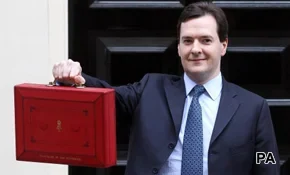George Osborne recently told the Conservative Party conference that the government will continue to fight the deficit and proposed a further £10bn worth of cuts from the benefits budget.
Areas of the welfare budget that may be targeted could include limiting housing benefits for under-25s and restricting benefit increases to below the rate of inflation.
Not all agree with this approach as a way of reducing the deficit, most notably the Government’s Coalition partners.
It was only last month that Danny Alexander, Chief Secretary to the Treasury, told the Liberal Democrat conference that they wouldn’t allow the deficit to be reduced “in a way that hits the poorest the hardest”.
However, supporters argue that it is impossible to balance the budget by simply taxing the rich.
Osborne said that, "just as we should never balance the budget on the backs of the poor, it's a delusion to say we can balance it on the wallets of the rich."
We asked Labs DEBATE participants whether they supported or opposed George Osborne’s proposal to cut the benefits budget by further £10bn.
Here’s what Labs debaters thought…

Most participants who took part in the Labs debate expressed their opposition to George Osborne’s proposal, and gave a number of reasons for their views, which are summarised below.
However, some participants in the Labs debate supported George Osborne’s proposal to cut the benefits budget by further £10bn to reduce the deficit, and thought it was a good idea to reduce the spending of the government.
Participants who opposed further cuts to the benefit budget
Many more participants opposed further £10bn cuts to the benefit budget than supported it.
Some participants believed that cutting the benefits budget further will only result in disorder.
“There are many other parts of the budget as a whole, reducing benefits gives people only one solution and that is to steal. Civil disorder will only result to such draconian policy, certainly at the level of 'Poll Tax' disaster”
Others said cutting the benefits further would mean vulnerable groups of people, particularly the young, are being penalised.
“I am not young myself but feel they are being penalised, quite a lot wish to have jobs and are unable to get jobs. Therefore, they cannot get on any property ladder whatsoever, and their parents will be forced to keep them for longer and longer. Don’t think one particular group should be targeted like this, but suppose it may appeal to some middle class people” jc MK
“These cuts would disproportionately affect the poorest and most vulnerable members of society during a period of serious economic downturn, and could push people in already difficult circumstances into an even grimmer existence. Taking away what little these people have will make society far poorer as a whole, while doing little to reduce the deficit” Jamie, Warwickshire
Cutting back on benefits will not reduce, but further increase the deficit, some Labs debaters said. They believed that the consequences of such cuts have not been fully thought through.
“Secondly, if you create a climate of fear, where people think that if they happen to lose their job, there will be no support for them then the population will cut back on spending en masse, pushing the economy further into recession, which in turn raises the number of people on benefits, and cuts tax revenue- increasing the deficit” ED, Northampton
“The economy is already stagnant; the only way to generate growth is to ensure that people have money to spend, thus increasing demand and therefore increasing the need to fulfil supply, i.e. jobs. By further limiting benefits Osborne is just shutting off any route to self-propelled recovery” Andy B, Darlington
Some Labs debate participants thought that while reorganising the budget to support those who need help the most would be reasonable, the total budget should not be cut. The cuts could be spread out and made on other budgets.

“The benefits budget is a safety net for the most disadvantaged in our society. There may be some scope for reorganising the budget to more accurately target the neediest, but the total budget should remain as it is. There are many other budgets that could and should be cut instead. For example, our Defence budget is far higher per head of population than most countries in Europe and should be reduced to the European average very quickly” Ian A, Bristol
A few participants spoke from their own experience, and said that the benefits they get are already not easy to obtain for those who really need them.
“I live on a pension and receive some benefits from the Government I would not say that help is easy to obtain and there are many criteria in place already to limit help given. There is no luxury living on this budget” Linda, Towcester
Participants who supported further cuts to the benefits budget
Many participants who thought cutting the benefits budget by further £10bn was a reasonable idea, said jobless people should be given incentives to work, instead of being rewarded for not working. This group of people believed that the money government spends on benefits could be put to better use.
“Benefits are one of the largest drains on government spending, absorbing money that could be used to more effectively boost the economy and create employment. Benefits are no longer a safety net, but an optional career” R – NW
Some participants who were pro-cuts on the benefit budget said that today benefits are too easy to get, and allow those who do not attempt to work to lead better lifestyles than those in employment.
“Benefits are far too liberally thrown around, reducing any incentives to work and helping the workshy to live better lifestyles than those physically working and paying their taxes. It is criminally insane to allow this to continue unabated and George Osborne is right to curb excessive abuses of MY/OUR taxes” Chris, North West
“The purpose of the welfare state should be to provide security for those who, through no fault of their own, find themselves unable to provide basic support for themselves and their dependants - a safety net for basic food, clothing, housing etc. It should not be a lifestyle choice, and it certainly should not enable people to make lifestyle choices that those in lower paid jobs simply cannot afford. Reducing the benefits budget is not only economically sound, but morally right” David, Worcestershire
Some Labs debate participants thought that cutting benefits of the poor would not be acceptable. Yet, they argued, there are too many people these days, particularly the younger generation, who do not need benefits – but are simply abusing the system.
“Certainly, any reduction in benefits should not affect the poor. However, whereas certain people are justified to receive benefits, there are others who do not. I know that many, particularly young people, receive benefits yet they often have an up-to-date and probably expensive mobile” Trevor R, Findon, Worthing
“I grew up having to manage with a restricted budget and I do not see why today’s youth should be any different. Important lessons are learnt particularly self-discipline which is sadly lacking in many people” M West, Lincolnshire
Some participants argued that nowadays, too many people abuse the benefit system, creating a highly unfair situation, where people who work pay for the lifestyles of fraudulent benefit claimers.

“I have personal experience of many people whose main job is to cheat the benefit system. They view it as a right and view people who work as stupid. I agree we have to support the weakest but abuse is rife”
Others supported the proposal merely as a way of cutting the expenditure of the government, which cannot be avoided.
“Common sense dictates that expenditure must be reduced across the board. At the same time production must increase to generate more income - and that requires investment. It is just extrapolation of personal or family finances. The welfare system should be a safety net for those who find themselves in great difficulty despite genuine efforts to provide for themselves and their family. Instead it supports an alternative life-style of entitlement without responsibility” Arthur H, Southampton
“The country is in a difficult economic climate and situation at the moment which can in part be attributed to over spending and excessive borrowing, living on credit etc. In order to reduce the debt cuts are necessary if not always popular. Countries such as Germany have implemented austerity measures and their economy now seems to be improving” Anon
Some participants said that while some reduction in the welfare budget could be made, the proposed cuts would be too much.
“I do think cuts could be made to the welfare budget, though I don't agree with the amount or all of the proposed measures” Ian S, Wales
“There needs to be some changes/cuts made to the benefits budget but the extent George Osborne proposes is approaching the issue the wrong way”

What are your views on the proposal? Share your thoughts below.







